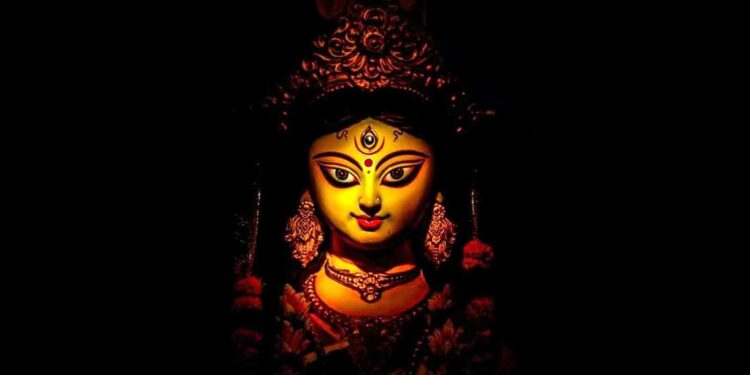Once upon a time, Brahmā and other deities worshipped Goddess Durgā with flowers and other offerings. Pleased, Durgā, the destroyer of all evils, said: “O Deities! I am satisfied with your worship. Ask for whatever you wish for! I will give you even the rarest of boons.” Hearing these words of the Goddess, the deities said: “O Mother! You have killed our enemy Mahiṣāsura—the biggest obstacle for the three realms. Now, the entire world has become healthy and fearless. It is only by your grace that we have regained our positions. You are like Kalpavṛkṣa [viz. The heavenly tree that grants any boon] to the devotees. We have come to your refuge, so now there is no desire left in our mind to get anything. We have got everything. Still, on your order, we want to ask you something for the welfare of humanity. O Almighty Goddess! What is that remedy by which you get pleased so soon and protect a person in trouble? O Mother! Even if it is very secret, please tell us.”
On this humble request, the compassionate Goddess replied: “O Deities! A series of my thirty-two secret names destroys all sorts of troubles. There is no other hymn like this in the three realms. Those names are as follows:
दुर्गा दुर्गार्तिशमनी दुर्गापद्विनिवारिणी ।
दुर्गमच्छेदिनी दुर्गसाधिनी दुर्गनाशिनी ॥
दुर्गतोद्धारिणी दुर्गनिहन्त्री दुर्गमापहा ।
दुर्गमज्ञानदा दुर्गदैत्यलोकदवानला ॥
दुर्गमा दुर्गमालोका दुर्गमात्मस्वरूपिणी ।
दुर्गमार्गप्रदा दुर्गमविद्या दुर्गमाश्रिता ॥
दुर्गमज्ञानसंस्थाना दुर्गमध्यानभासिनी ।
दुर्गमोहा दुर्गमगा दुर्गमार्थस्वरूपिणी ॥
दुर्गमासुरसंहन्त्री दुर्गमायुधधारिणी ।
दुर्गमांगी दुर्गमता दुर्गम्या दुर्गमेश्वरी ।
दुर्गभीमा दुर्गभामा दुर्गभा दुर्गदारिणी ॥
(1) Durgā, 2) Durgārti-Śamanī, 3) Durgāpad-Vinivāriṇī, (4) Durgama-Cchedinī, (5) Durga-Sādhinī, (6) Durga-Nāśinī, (7) Durgatod-Dhāriṇī, (8) Durga-Nihantrī, (9) Durga-Māpahā, (10) Durgama-Jñānadā, (11) Durga-Daityaloka-Davānalā, (12) Durgamā, (13) Durgamā-Lokā, (14) Durgamātma-Svarūpiṇī, (15) Durga-Mārga-Pradā, (16) Durgama-Vidyā, (17) Durga-Māśritā, (18) Durgama-Jñāna-Saṃsthānā, (19) Durgama-Dhyāna-Bhāsinī, (20) Durga-Mohā, (21) Durgamagā, (22) Durgamārtha-Svarūpiṇī, (23) Durgamā-sura-Saṃhantrī, (24) Durgamā-yudha-Dhāriṇī, (25) Durgamāṅgī, (26) Durgamatā, (27) Durgamyā, (28) Durgameśvarī, (29) Durga-Bhīmā, (30) Durga-Bhāmā, (31) Durgabhā, (32) Durga-Dāriṇī.
“The person who recites this Nāma-Mālā of mine will certainly be free from all sorts of fear. Whether being tortured by the enemies or trapped in terrible bondage, one will undoubtedly be free from trouble by merely reciting these thirty-two names. If the state becomes angry and sentences death or any other harsh punishment, or the enemy surrounds in war, or there is fear of ferocious animals like tigers in the forest, then by merely reciting these thirty-two names 108 times, one becomes free from fear. There is no other remedy like this to destroy fear in times of trouble. O Deities! The person who recites this Nāma-Mālā never faces any harm. The one who recites this Nāma-Mālā one thousand (1,008), ten thousand (10,008), or a hundred thousand (100,008) times himself or gets it recited by virtuous Brahmins in case of great trouble becomes free instantly. The Puraścaraṇa of this Nāma-Mālā [viz. The practice to complete the initial number of counts to fully activate the special spiritual powers in a fixed time-period] is 30,000 [+ 20% = 36,000; to compensate the Homa, Tarpaṇa, etc.]. By reciting it in this number with good conduct, a person can accomplish all his tasks in particular. The one who worships me every day never falls into trouble.”
Saying this, the Mother Goddess disappeared right there.
Note: As accounted in ‘Tripurā-Rahasya’ (Māhātmya-Khaṇḍa, Chapter 46) and recommended by the Divine Mother herself, this Nāma-Mālā is a simple, safe, yet highly potential practice. Anybody, with utmost devotion, can freely chant it at any point of time; but with a fixed number of counts for ‘n’ number of days [say 108 per day for at least 48 days] to generate astounding benefits. Initiation and other rituals are not mandatory, chanting with devotion is complete in itself. The suggested counts per day [viz. Between two consecutive sunrises] are: 28 or 108 on regular days, 108 or 1,008 during Navarātri; in single or multiple sitting(s) as per convenience. Let us collectively perform Śakti Sādhanā with this Nāma-Mālā to protect our personal, religious, and national interests.




![[ India Today ] Ohio senator JD Vance thanks wife, a Hindu, for helping him find Christian faith](https://hinduvishwa.org/wp-content/uploads/2024/06/us-senator-jd-vance-reveals-how-his-hindu-wife-usha-helped-him-find-his-christian-faith-image-re-272530504-16x9_0-120x86.webp)










